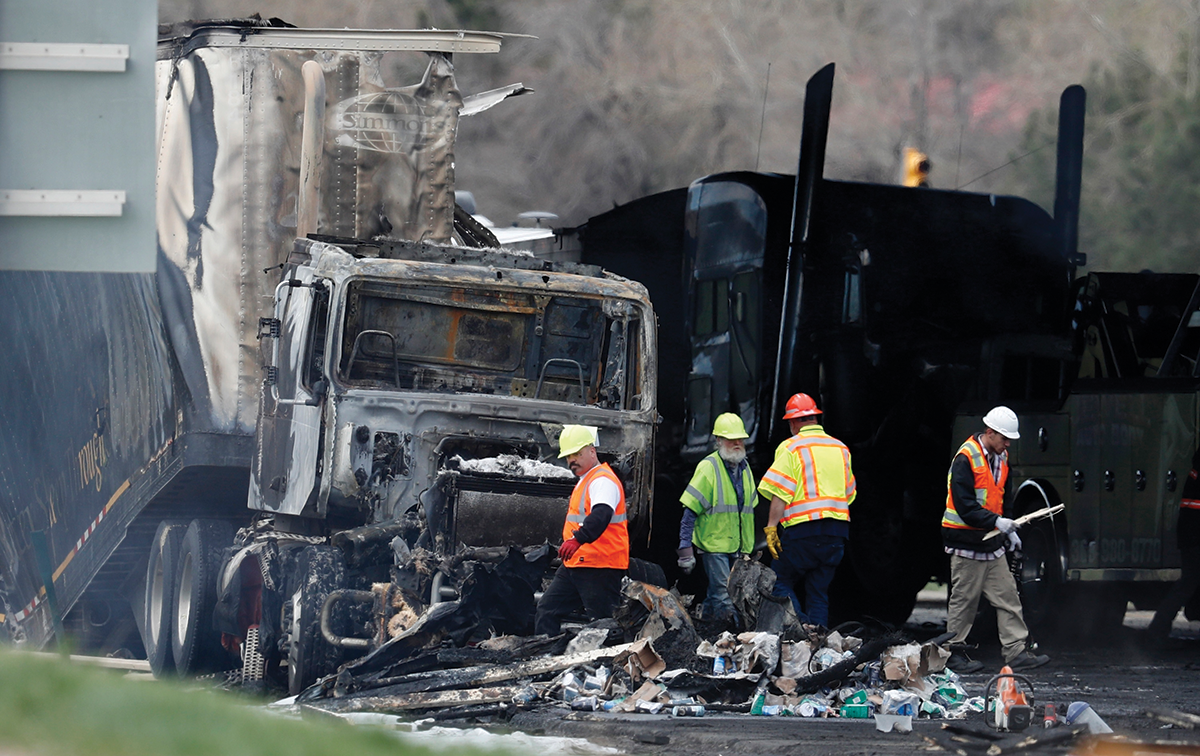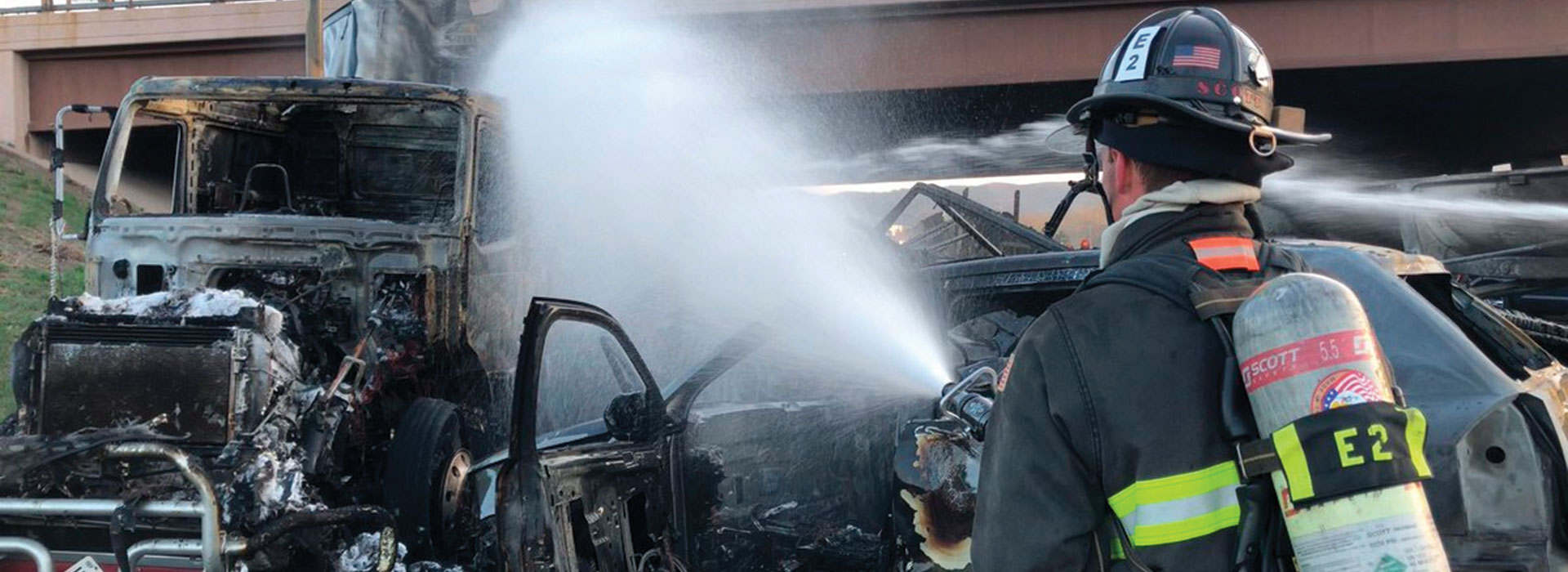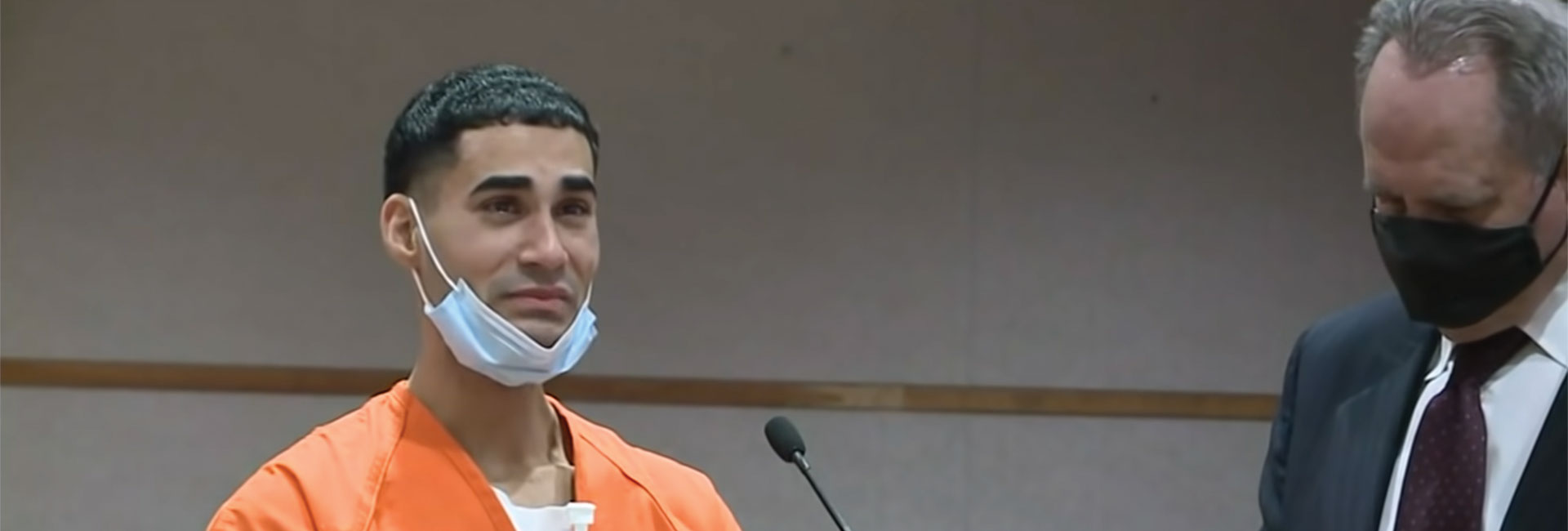
Standing in front of a judge, tears in his eyes, Rogel Aguilera-Mederos wanted to say something before being sentenced for killing four people and injuring six others after he lost control of his runaway truck on a Colorado highway.
At 26 years old, he was facing the possibility of spending the rest of his life in prison. He lowered his surgical mask to speak.
“My English is not very well, but I’m going to try,” Aguilera-Mederos, a Cuban immigrant, said to Colorado District Court Judge Bruce Jones at his sentencing hearing in December.
For the next 16 minutes, Aguilera-Mederos cried as he begged for forgiveness, spoke of his love of God, his commitment to family and his empathy with the victims. “I am not a criminal,” he said. “I would have preferred God taken me instead of them because this is not life.”
Aguilera-Mederos, an inexperienced truck driver, was just 23 when the crash happened in 2019 in Jefferson County, outside Denver. He said his brakes failed as he rapidly descended from the mountains on I-70 at speeds of up to 85 mph, plowing into traffic and igniting a deadly inferno. Prosecutors said his negligence and indifference were to blame for the 28-vehicle crash and that Aguilera-Mederos could have taken evasive action by using a runaway truck ramp.
Killed that day were Miguel Angel Lamas Arellano, 24; William Bailey, 67; Doyle Harrison, 61; and Stanley Politano, 69. Their surviving family members, along with others injured in the crash, sat behind Aguilera-Mederos as he tearfully pleaded for mercy. They also had spoken about the pain they endured, the lives cut short, the emotional toll it had taken. They wanted justice.

“What I want today is that I’m begging for forgiveness,” Aguilera-Mederos said. “This was a terrible accident, I know. I take the responsibility, but it wasn’t intentional.”
A jury already had decided that it was more than just an accident, convicting Aguilera-Mederos of 27 criminal counts related to the fatal crash.
The judge said he had no choice but to hand down the sentence required by law—110 years in prison. “I will state that if I had the discretion,” the judge said through his mask, “it would not be my sentence.”
The judge noted that none of the victim impact statements demanded that Aguilera-Mederos spend the rest of his life in prison. “There was forgiveness reflected in those statements,” he said. “But also a desire that he be punished and serve time in prison, and I share those sentiments. ... I accept and respect what the defendant has said about his lack of intent to hurt people, but he made a series of terrible decisions, reckless decisions.”
Until that moment, the case was little known outside of Colorado. But that changed overnight as the news spread through social media, along with video clips of Aguilera- Mederos making his tearful plea. Suddenly, millions of supporters were signing an online petition seeking a reduction in his prison time and calling for changes in mandatory minimum sentencing laws.
“The next day was when the media blitzkrieg started. I mean, it was just crazy,” recalls Aguilera-Mederos’ defense attorney, James Colgan. “It was lightning fast how it happened. Before I knew it, I was getting a call from the governor’s office.”
More than two years before that call from the governor, Aguilera-Mederos was living in Houston when a friend and fellow truck driver recommended him for a job at a small trucking company. Aguilera-Mederos, who’d had his Texas commercial license for less than a year, applied for a position with Castellano 03 Trucking. The owner, a fellow Cuban immigrant, Yaimy Galan Segura, had no experience running a trucking company when she started it at the suggestion of a neighbor. She learned about the business online and created a limited liability company.
The company had a history of violations. The Federal Motor Carrier Safety Administration records show it was cited for 30 safety violations in the two years prior to the crash. The company received 23 vehicle maintenance violations, 10 involving brake issues. The company also was cited twice because its drivers did not adequately speak and read English.
Segura hired Aguilera-Mederos after verifying he had a Texas commercial driver’s license, checking his safety record and contacting a couple of references, though he had not listed his most recent employer. Within two weeks, Aguilera-Mederos was on the fateful run that would forever change his life and those of dozens of others.
On April 25, 2019, Aguilera-Mederos was hauling a trailer full of lumber from Wyoming to Texas when he passed through the Colorado mountains and began a dangerous descent on I-70. During the trial, he testified that he had no experience driving in the mountains. His brakes got hot and began to falter.
When Aguilera-Mederos realized his brakes were out, he considered several options, such as driving on the median or on the shoulder, he said. When he saw another truck blocking the shoulder, he swerved and hit the trailer “but once I hit it, I was not able to control anything,” he said.
“A few seconds before that, I said, ‘Dear God, don’t let anything bad happen,’” Aguilera-Mederos later testified. “At the moment of the impact, I closed my eyes and hugged the wheel.”
His lawyer said the crash was unavoidable. “This was someone who could not control a runaway vehicle, even with his best efforts and everything he knew how to do,” Colgan said, blaming the brake failure on improperly maintained parts before the trip began.
Prosecutors told a different story, saying that Aguilera-Mederos made a series of poor decisions and could have prevented the crash. Witnesses said Aguilera-Mederos was driving recklessly before the crash, and along the route he had stopped to check the brakes but kept going even though he knew there were problems.

After Aguilera-Mederos was arrested, the Jefferson County DA’s office, then led by Peter Weir, charged him with 42 separate criminal counts, including vehicular homicide, first-degree assault, attempted first-degree assault and reckless driving. Aguilera-Mederos had two different defense lawyers represent him before he landed with Colgan after a referral from a Cuban friend in Houston.
“When I first met Mr. Mederos, he was quiet and tearful. Very remorseful yet adamant that this was all a tragic accident,” Colgan says. “I found him to be very upset and traumatized. And I don’t want to diminish what happened to the people who died. He has PTSD about this as well.”
Colgan says he was not aware of any plea discussions before he took over the case in May 2020. So he decided to open up talks.
“I sat down with some people in the DA’s office, and we had a very long conversation about a potential plea,” he says. While he wouldn’t disclose the DA’s offer, he said it was unacceptable.
The DA’s office, now headed by Alexis King, did not respond to requests to discuss the case with the ABA Journal.

Among the charges were six counts of first-degree assault and 10 counts of attempted first-degree assault. What made those charges noteworthy was that the law in Colorado says the act must be committed intentionally and with “extreme indifference to the value of human life.” First-degree assault in the state carries a penalty of 10-32 years in prison. If convicted, the sentences must be served consecutively. By contrast, the charge of vehicular homicide states, “If a person operates or drives a motor vehicle in a reckless manner, and such conduct is the proximate cause of the death of another, such person commits vehicular homicide.” The penalty for vehicular homicide can vary between 2-6 years, depending on whether one is under the influence.
Colgan, a former prosecutor, knows that DAs often overcharge cases for leverage, but he had never seen anything this extreme, especially in a case in which it was clear his client did not intend to kill or harm anyone. He also questions why his client would face both assault charges and vehicular homicide for the same victims.
Stan Garnett, a former DA in Boulder County, Colorado, and now a shareholder at Brownstein Hyatt Farber Schreck in Denver, believes the volume of charges was excessive.
“I think prosecutors need to become more careful and more prudent about what they charge,” he says. “They do it to create plea bargaining pressure so that a defendant will feel obligated to take whatever deal is on the table because if they go to trial, it could be catastrophic. You want to have a system where people feel comfortable exercising their right to trial.”

Up until the 1990s, Colorado had few minimum mandatory sentencing laws, which allowed judges to determine sentences in most cases.
“That system, in my opinion, worked pretty well. But it wasn’t perfect,” Garnett says. “With the late ‘80s and early ‘90s increase in crime rates, similar to what we’re seeing now around the country, legislators started putting into place more and more mandatory sentencing.”
These laws not only created minimum mandatory sentences, “but also sentences that had to be served consecutively,” he says. “It means that a DA is able, by how they fashion the charges on the case, to predict pretty accurately what the sentence will be.”
In the Aguilera-Mederos case, “this was kind of the perfect storm of all of this coming together,” Garnett says.
“Given the way the case was charged, and the way the jury’s verdict was, you ended up having a judge with his hands tied.”
Not long after the crash in 2019, a young Colorado woman posted a petition on Change.org, the organization that has tapped into the power of social media to advocate for causes that range from commuting sentences to passing small-town municipal ordinances. The petition sought to absolve Aguilera-Mederos of criminal responsibility, saying that the crash was an accident, and his employer bore much of the blame. It noted that Aguilera-Mederos complied with the police and was not drunk or on drugs. In the beginning, there were just a few hundred signatures.
More than two years later, after news of his sentence spread, support rocketed. “It really was extraordinary,” says Amanda Mustafic, communications director at Change.org. “It came to our attention because it was spiking.”
Not only were people in the U.S. signing on, but thousands from Mexico and other Spanish-speaking countries in South America also were signing the petition. Mustafic says “Justice for Rogel” was among the fastest-growing petitions on Change.org in the U.S. in 2021. The count reached 5,117,660 signatures.
“The images of him crying was a touchstone for so many people,” she says. “People did feel he was a scapegoat. I think there was a feeling that we overcriminalize.”
Truckers also joined in support of Aguilera-Mederos, with TikTok videos and calls for a boycott of driving in Colorado. Adding to the swell of support was Kim Kardashian, who posted several tweets after she said she took a “deep dive” into the case. “Colorado law really has to be changed, and this is so unfair,” she wrote.
Aguilera-Mederos’ lawyer read many of the online comments. “There were a lot of articulate arguments as to why this was a miscarriage of justice,” Colgan says. “They weren’t people on the fringes who were making these comments.”
"People did feel he was a scapegoat. I think there was a feeling that we overcriminalize." –Amanda Mustafic
Also joining the campaign was Jason Flom, record executive, longtime criminal justice reform advocate and podcast producer. He also hosts the popular podcast Wrongful Conviction. (See “Behind the Mic,” page 28.)
“I mean, this is not a guy who did anything on purpose,” Flom says. “The culpability lies more with the people who didn’t train him and put a 23-year-old kid with limited training behind the wheel of a massive 18-wheeler.”
Flom says those who second-guess the driver’s actions could not possibly understand what it was like to be in his shoes.
“Here is someone in full panic. I think it’s preposterous and disgusting for people to say, ‘Here is what I would have done,’” Flom says. “I think the appropriate sentence for Rogel should be community service.”

After Aguilera-Mederos was sentenced, Colgan began drafting a clemency petition to Colorado Gov. Jared Polis. Four days after the sentencing, and much to Colgan’s surprise, the Jefferson County DA filed a request for a hearing to reconsider the sentence. She noted that her office would confer with the victims.
Some of the surviving family members agreed the sentence was too long, but they were bothered that Aguilera-Mederos was being portrayed as a victim in the news and on social media. Kathleen Harrison, whose husband, Doyle, a graphic designer, was among the four people killed, says the case was often mischaracterized and oversimplified on social media, which led to the extraordinary number of people signing the petition.
“Clearly, people were signing based on not knowing anything except here is this poor immigrant truck driver whose brakes failed,” says Harrison, a mother of three who had been married to her husband for 26 years. “As if it was just a mechanical failure.”
At the same time, Harrison says 110 years was too much. “Yes, he deserved jail time, but I didn’t want his whole life to be gone,” she says. “What he did was stupid. He was not well-trained.”
Duane Bailey, whose brother William was killed in the crash, says the onslaught of publicity was almost too much to handle as the tragedy played out again on the national news. “It took me back to the day of the crash. I felt as bad as I did back then,” he says.
He also resented how the case was presented on social media. “It was drawing in all these people who didn’t know what was going on. They had no idea about the evidence that was put on, and all they see is this poor truck driver sentenced to 110 years without knowing there was direct evidence for everything he did that day,” he says. “And while it was not intentional, he was extremely reckless and extremely careless and had no regard for anyone else on the road that day.”
"I think he was sorry it happened. I don't think he fully grasped that most of it was his responsibility." –Duane Bailey, brother of crash victim William Bailey, about Rogel Aguilera-Mederos.
Gage Evans, William Bailey’s widow, wrote a letter to the Denver Post that was published three days after Christmas. “Lost in the national conversation around the driver’s sentence is any effort to understand the experience of the actual victims. I also received a life sentence that day. Rogel Lazaro Aguilera- Mederos is not a victim but a responsible party whose decisions caused avoidable deaths and injuries that fateful day.”
Nonetheless, before the end of the year, Gov. Polis granted Colgan’s petition to commute Aguilera-Mederos’ sentence. “After learning about the highly atypical and unjust sentence in your case, I am commuting your sentence to 10 years and granting you parole eligibility on Dec. 30, 2026.”
The governor described the crash as a “tragic but unintentional act” and wrote, “While you are not blameless, your sentence is disproportionate compared with many other inmates in our criminal justice system who committed intentional, premeditated or violent crimes.”
Polis also noted that the sentence “was the result of a law of Colorado passed by the legislature and signed by a prior governor and is not the fault of the judge who handed down the mandatory sentence required by the law in this case.”
Colgan says he was surprised and pleased that the governor moved so quickly—more quickly than King’s office. “It was a race to the courthouse,” he says. King “was trying to take it out of the hands of the governor. It was a political contest. The governor beat her to it.”
Duane Bailey, who favored a shorter sentence, thinks the governor was too hasty. “While the governor certainly had the right to do it, I think it was inappropriate because I think that he thinks he’s restoring the faith in the justice system. I think he actually overrode the justice system.”
James Felman, chair of the ABA Sentencing Standards Task Force, says the Aguilera-Mederos case has once again brought the issue of mandatory minimum sentencing to the forefront.
“It’s another high-profile example of a sentence that was excessive as a result of mandatory minimums and a consensus among all the players that it was wrong and needs to be fixed,” he says. “Things like that are powerful.”
The ABA has opposed mandatory minimum sentences for more than 50 years. In 2017, the House of Delegates reaffirmed its opposition and went further by urging Congress, state and territorial legislatures “to repeal laws requiring minimum sentences, to refrain from enacting laws punishable by mandatory minimum sentences.”
In August, the House of Delegates called for abolishing mandatory minimum sentencing in its adoption of the ABA Ten Principles on Reducing Mass Incarceration. The principles say: “Mandatory minimum sentences not only contribute to the mass incarceration problem in the United States; they are also inequitable and counterproductive.”
“If you have a system of mandatory minimums, not only does it give the sentencing discretion to the prosecutor, but it hands the prosecutor all these hammers they can use to extract a plea,” Felman says.

Colorado Sen. Bob Gardner, a Republican, is on the state’s Sentencing Reform Task Force, which the governor created in 2020. “Mandatory minimums were themselves an attempt to address inequities, or some perceived inequity,” he says. “They now seem to be the source of inequity, and I believe we will continue to have that debate ... as the culture develops, as times change.”
Gardner notes that across the country, there’s a sense that mandatory minimums tie the hands of judges and don’t allow them to exercise discretion. “If you look back at historic times, there has always been this question of how much discretion to grant the courts and when we do, there will be outlier sentences, and when you have mandatory minimums, we will likewise have cases that are something of a one-off because of their particular facts and circumstances.”
As a board member of FAMM, a nonpartisan advocacy organization for fair sentencing and prison policies also known as Families Against Mandatory Minimums, Flom says he has seen progress at the federal level.
“It’s still obscene that we put people away for the rest of their lives for what is considered in other countries minor infractions,” he says. “There has been progress, but it has not been fast enough for my liking and not for the people who have been suffering behind bars serving these crazy sentences.”
Segura, owner of the trucking company that employed Aguilera-Mederos, was a witness against him during his trial, and she was not charged in the case. However, three families who lost loved ones filed lawsuits against her company and shared a payout from the minimum required carrier insurance of $750,000.
After the crash, Segura dissolved Castellano 03 Trucking and started a new company with a different name, Volt Trucking. That company is inactive. Segura could not be reached for comment.
Michael McCormick, a Houston-based attorney, represents Harrison, who is suing Shipping Connections, the Arkansas-based broker that arranged the transport of the lumber with Castellano 03. McCormick says Shipping Connections failed to check the safety record of Castellano 03 and its driver.
“Our position is that they have a duty to put safe drivers on the road,” he says. “It ought to be public policy.”
Federal Department of Transportation records show that Aguilera-Mederos was not properly trained before taking the fatal journey. “The carrier did not ensure this entry-level driver received required training prior to operating in interstate commerce.” He had been fired from his previous job because he did not know how to drive a stick shift.
“They should have never put that guy in a truck,” McCormick says. “He was in way over his head driving a tractor-trailer. It would be like possessing a pilot’s license for a Cessna and piloting the space shuttle.”

McCormick says the case is symbolic of a larger problem. “It’s not just the company but the entire industry and enterprise of shipping freight. When you’re moving commerce for profit, every entity takes on the responsibility that the movement of the freight is safe.”
The CEO of Shipping Connections did not respond to requests for comment. Colgan also is frustrated that Segura’s company escaped criminal responsibility.
“It’s obscene that they were not charged at all. But you can’t force the prosecution to prosecute somebody,” he says. “My client was the lowest-hanging fruit. He was the easiest guy to prosecute. He had the least amount of power, the least amount of resources, so he was the easiest guy to go after.”
And while his client made some poor choices while driving, Colgan believes Aguilera-Mederos was simply scared.
“Do I think that his actions showed a conscious disregard for human life? No. What I think was this was a kid who was in over his head, and he was scared to death and didn’t know what the hell to do.”
Duane Bailey misses his brother, a designer and engineer. The last time they were together was at a concert about three weeks before the accident where they saw a local a capella group and an Eagles tribute band. He always thought that Aguilera-Mederos deserved some prison time. “All I expected was to hold him accountable for what he did,” he says. “I think he was sorry it happened. I don’t think he fully grasped that most of it was his responsibility.”
He thinks the 10 years Aguilera-Mederos got was too light because he will probably be out in five years. “Five years for four deaths and all the carnage he did and for the lack of care he showed is way too little,” Duane Bailey says.
“It’s not going to bring my brother back. Nothing is going to fix that. It’s not a simple case. People think it’s open and shut.”